#effective lead nurturing tactics
Explore tagged Tumblr posts
Text
Mastering Lead Follow-Up: Nurturing Online Marketing Campaign Leads for Business Success
Crafting Connections: The Blueprint for Expert Lead Follow-Up In the dynamic realm of online marketing, generating leads is just the initial step. The true power lies in the follow-up—the art of turning potential prospects into devoted customers. In today’s competitive landscape, where attention spans are short and choices are vast, mastering the skill of lead nurturing is indispensable for…

View On WordPress
#automated follow-up sequences#building lasting customer relationships#business growth through lead follow-up#educational content delivery#effective lead nurturing tactics#expert lead engagement techniques#lead conversion methods#lead follow-up strategies#leveraging social proof#multi-channel engagement#nurturing potential customers#online marketing leads#persistent yet respectful communication#personalized communication#segmentation techniques
0 notes
Text
On (soccer) partnerships, commitment, and why Nagi and Reo are the poster children for always doing the opposite of what the series is about
Alright fellas, this started out as something completely different, so forgive me in advance if it feels disjointed, but.
Have you wondered why in chapter 18 of epinagi, Nagi’s inner monologue complains that his “heat is being stolen away”? Or why even in the main series Nagi can’t seem to win a single match even after he and Reo get on better terms? Well, if you have, this post might be a fun read for you. If you already have answers, I might sound like I’m stating the obvious because none of this is particularly subtle or particularly new. But since both series have hit the Nagi Flop Era, I thought it’d be fun to take a deep dive into his character and Reo’s, the themes of the story, and how their codependence contradicts the entire premise of blue lock, intentionally so. I’m going to go over why stagnancy is the entire point of their partnership, and why the fact that they keep failing and failing is instrumental to the type of story Kaneshiro is trying to tell.
So, without further ado. Get comfortable, this will get long.
So, as I anticipated, Nagi and Reo are very very often written to be at odds with the themes the story functions around, and I think their regression is another instance of that. In a manga that often underlines the importance of making soccer your “reason to exist” if you’re serious about it, Nagi and Reo are the only duo repeatedly singled out as more committed to each other than to the sport itself. This, the story tells us, being the root of why they so often fail.
The premise of blue lock is that you can’t become the best in the world until you dedicate your whole self to the sport. Only that egoism will push you in the right state of mind to go above and beyond for a victory.
Time and time again, we see the most outstanding goals happen in what gets called the hottest place in the field. This “center of heat” comes up a couple of times, and it’s usually represented by a person. According to Ego’s philosophy, the idea is that the world’s best striker possesses a soccer-specific kind of charisma. When he enters a state of flow and pulls off a world-class play, he’ll have a ripple effect on the players around him, pushing them to reach flow too and elevating the level of the game itself. We saw this happening in the U-20 match. Ego’s not really aiming to create a national team, or to foster the talent of the new generation. He only cares about nurturing one person into that role, betting it all on the fact that once that striker awakens from its “rough diamond” shell, they will fire up their teammates & lead Japan to victory.
Because of this, ideally, everyone aiming at becoming the world’s best striker should strive to be that center of heat. To an extent, even Nagi does. His motivation is spotty at best, but whenever a game heats up, Nagi’s ego gets tickled awake the same as everyone else’s. This is not limited to the times Isagi challenged him, by the way. He reacted to Rin’s skill in much the same way.
Problem is, neither Nagi nor Reo seem to know how to become that center of heat by themselves. They only react to someone else raising the stakes of a match. Even when Nagi feels fired up, his lack of creativity & playmaking sense fail him against any opponent who is more tactical than him. In a similar way, even when Reo starts going after goals alone in the wake of his split from Nagi, he still can't see his vision of a goal through to the end, or gets outsmarted and beaten to the punch by other playmakers.
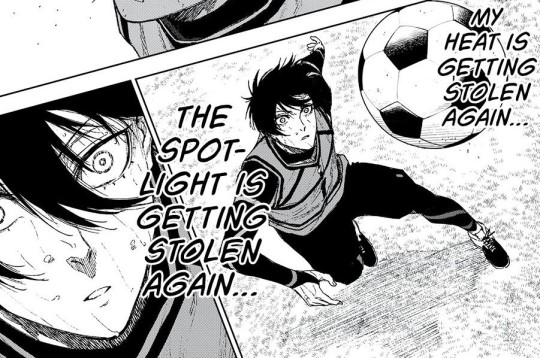
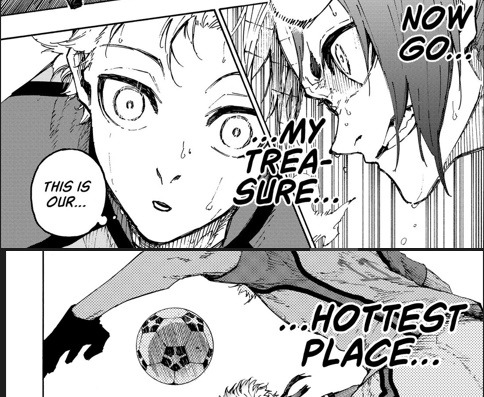
The only times they really get their head into a game is when they're working as a duo. Compare for example Nagi losing grasp of his heated frenzy when he splits from Reo to how quickly he reaches flow when they go back to playing together.
So why is this an issue? If Nagi's limit is his over-reliance on instinct, and Reo's is the lack of self-centeredness that's key to scoring, then shouldn't teaming up solve the problem and make them a powerhouse? How come, even after somewhat resolving their communication issues, their soccer still is no match to that of the blue lock elites?
Well, before I can begin to unpack the answer to that… A big theme driving the soccer partnerships is that you won’t go very far if you rely too much on the other person to carry your weight. This is the reality Bachira faces in the 4v4, when he “disappears”, swallowed by everyone else’s growth. This is also the lesson Rin learns from Sae when his brother returns from Spain a completely different, overwhelmingly superior player. The series tells us that relying on others to pick up your slack makes you less sharp and prone to noticing your weaknesses because someone else will cover your back.
For a practical example of this, Rin's style when he played with Sae mirrors Nagi's around Reo: they both relied on instinct, trusting that the ball would always come if they just positioned themselves in the right spot to score. And for a time, it did. But that's not the level the rest of the world plays at. Nagi and Reo's winning streak ends when they face an unpredictable, explosive talent like Isagi, who doesn't operate according to any predictable patterns. Similarly, Rin's playstyle gets wrecked in a matter of minutes by a Sae who got to experience the "real" soccer played overseas.

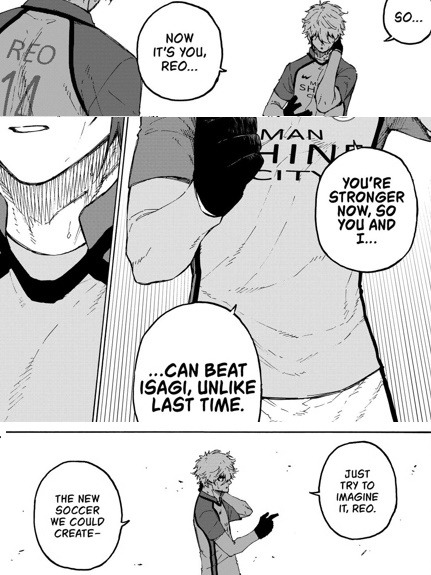
The point, then, is that Nagi and Reo never really assimilated any of Ego's lessons, instead resisting his philosophy to a fault by choosing each other. From the start, they’re not very good at being apart, given how their strength draws from being a team. Both of them are noted to only ever increase the level of their plays when they are working together, but not as much when alone.
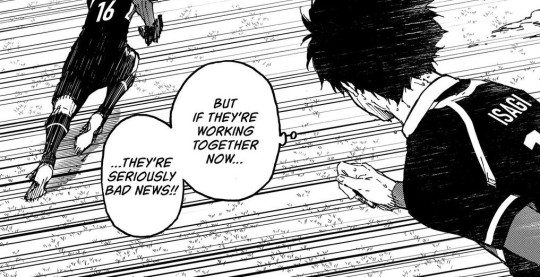
Nagi’s the brawn to complete Reo’s brain, and their dynamic too often falls back on that codependent partnership. In fact, they default to their roles even when they're not playing with each other. During the second selection, Nagi replaces Reo with Isagi, continuing to rely on someone else's creativity and game sense, while he just follows. And in the 3v3, we similarly see Reo fall back on playing the midfielder to Kunigami and Chigiri's forward, offering up the perfect passes to make them shine and get all the scoring options they want.
But what about when they're together? Aren't they strong then? Didn't Nagi score a crazy super goal thanks to Reo's assist? What do we make of that?
You'll probably remember how Ego got a sense of foreboding from Nagi's five shot revolver. Of course, you might say, Ego never liked their soccer! He was cussing them out for playing together since day one! Of course he's a hater!
Well… Yeah. But Ego's also an authorial insert, and he's there to tell us the themes of the story, and comment on the characters growth. Or in this case, their stagnancy. Nagi's returning to his reliance on Reo's brains and Reo's willingness to entertain it are both framed as a bad thing because it specifically contradicts the idea the series is based on: that a real striker is an egotistic, self-reliant existence that doesn't bend to other people's rules, but instead dictates their own, and makes everyone follow or fall through in their wake.
There are several players this definition already applies to. Rin, Barou, Shidou and of course Isagi all come to mind. Isagi's growth in particular has been rotating around this concept. Isagi not only believes in his (meta) vision, but he also possesses the sharp-wit and the cutthroat resourcefulness to see it through no matter the odds, at times even to the detriment of his teammates. Nagi and Reo, on the other hand, can pull off some incredible plays, but it’s never enough to land them a solid victory, especially in the NEL arc. Usually, in a story, when a character fails enough times to become stagnant, the author is making some kind of point. In this case, as the narrative itself points out through Isagi first and Agi later, it’s the concept that relying on their teamwork is actually making Nagi and Reo’s soccer worse.
Sure, Nagi might've caught Isagi off guard with those feints once and managed to score, but that's still him relying on instinct over brains. If you dissect that match, you'll see that aside from the fake volley itself, which is the product of a non-replicable state of flow, there isn't a single move Nagi and Reo made during that game that Isagi didn't see through, expect, and match their pace at. This is by design, of course. It's meant to indicate that while Isagi grew, learning from stronger players and assimilating new elements in his arsenal of weapons, Nagi and Reo are still stuck playing the same way they did in the second selection. With Reo as the heart, brain and anchor directing Nagi around, and Nagi as the leg kicking the ball into the net following a momentary burst of inspiration.
The fact that this is intended as a setback in their path towards a more egotistical soccer is made more obvious by the timing. It's not a coincidence that Nagi went back to Reo the moment he got frustrated by how hard creativity and tactics come to him when he's on his own, without a "handler" like Reo (and later Isagi) taking care of all the hard parts.
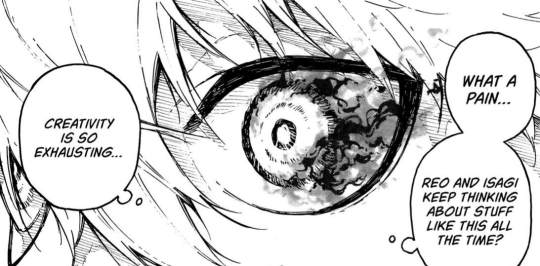
Nor is it a coincidence that Reo was faced with the choice to go back to helping Nagi out right when Reo was beginning to go after his own goals, without help. Nagi comes up to him and shakes him up literally one (1) panel after Reo's dramatic, resolute decision to prove himself alone.

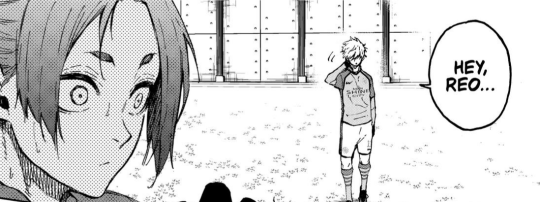
Had they gotten anywhere in their quest to polish their individual skills during the split, maybe their partnership could’ve aspired to become more like Isagi and Bachira’s, eventually. However, they weren’t apart long enough to master their respective strengths, or to consolidate their egos as something separate from their status as partners. Thus, when they resume playing together, they instead hold each other back.
So is their ego the problem here, then? Ever since that five shot fake volley, we see Nagi’s dissolve, leaving him unmotivated again, grasping for answers he can't seem to reach no matter how many people he asks. And surely, its disappearance is significant, much like how Reo's ever changing definition of his own ego is also significant. But I think the real issue is something else. Egos can take many forms, and Nagi and Reo aren't the only players whose so-called “protagonism” isn’t rooting for their own success. Most recently, Hiori gained an ego too, and it was framed as a good thing even though it doesn’t strictly lead to him becoming the best striker in the world.
My idea, then, is that it's less that they lack the "correct" ego, but more like they lack the correct attitude towards soccer to begin with. From the start, they're both motivated by something that is not inherent to soccer itself, but only tangential to it: the World Cup—or rather, their promise to each other that they'd win the World Cup. Because of this, I think, they center their football more around their partnership & their shared dream than any genuine passion for the sport, unlike pretty much the rest of the cast (now including Hiori. Yay!). In other words, the problem is that neither of their egos is really about themselves, yet. So it fails them because it's not conductive to "protagonism", but centered around an "us" that drags them off course.
Let's go with Nagi first. On the surface, "commitment" and "Nagi Seishirou" don't seem to go well in the same sentence. Nagi doesn't do anything excessively. He's content to coast through life doing nothing more than he strictly needs to survive. As long as he can put in minimal effort and still have time to play video games and nap, he's happy. When his teachers asked him to fill a form about his future, he couldn't think of anything he wanted to do. He's the embodiment of living one day at a time cause it's too much work to figure out his life past that. Yet, he genuinely commits to soccer.
Or does he?
Sure, he agrees to not only playing the sport, but to dedicating several years of his life to becoming pro. That’s dedication, for sure. But is it really for soccer? I would argue that no, Nagi’s commitment is to his partnership with Reo, not to the sport itself. And okay, you can’t have one without the other, but the distinction is important to understand Nagi’s (and Reo’s as well) resistance to character growth.
So, Nagi had no passion for the sport until he saw the level some other elite blue lockers played at, and got curious and frustrated enough to put real effort in it himself. But until then, soccer was simply something he tagged along in. In fact, he was pretty unenthused with the idea of playing until Reo promised him an easy life and made it so Nagi wouldn’t have to work hard for it. Nagi signs up for blue lock with the expectation that he’ll be the one to flunk out first, without being too torn up about it. Clearly, it’s not a career as a professional soccer player he has an attachment to. I’d argue it’s more the fact that he feels comfortable around Reo, and he is invested in what only their agreement can bring forth. That is, a life more exciting than any nap or game.

The excitement part is the focus here. At their core, both Nagi and Reo’s characters are motivated by the wish to escape boredom. So much so, the epinagi movie made that its tagline. Thematically, dissatisfaction with boredom is the catalyst for every choice they make. While everyone else is motivated by an ambition that is inherent—that draws from their wish to excel—Nagi and Reo are more prize-oriented, lacking the conviction that they’re special on their own. It follows that the challenge of bringing home the World Cup represents just that—for Nagi, it’s the thrill of a final boss with the prospect of an easy life afterwards, and for Reo, something hard to obtain that he’d conquer by his own merit. In both cases, soccer for soccer’s sake is not the end goal. It’s just a tool to achieve what they really want.
Neither of them ever really dreams of becoming the world’s best striker, and neither swears their entire life to soccer, either. Not even Reo ever brought up a career in the sport, past winning for Japan for the first time. This is why I say their commitment is more to each other than to football, and also why they struggle to advance in the program.
Let's think about it. The Cup was never really Nagi's dream; beating Isagi was. Yet, when their partnership all but crumbles down, Nagi keeps making choices with the Cup in mind. The boy who never fought for anything becomes determined to honor his promise to Reo even if he's not certain that Reo still cares about it. By his own admission, he chooses Isagi and then England because both of those things bring him closer to their original goal, and Nagi's resolve for that has never waned, even if for a time he thought Reo's had.
It's like he clings to inertia to avoid thinking what the sport means to him. Despite how Reo seemingly turned his back on him, Nagi doesn't want to give up on what made them partners. To him, soccer never stopped being something they shared (to a fault). That's why, I think, when they make up, a big part of their reconciliation is going back to sharing a dream. This time, with Reo helping Nagi out instead of the other way around. And I'm saying that's a flaw because his subconscious need to seek answers and help from others made it so that whenever he's alone, he doesn't have a very defined idea of how to move forward. But again, a striker should be self-reliant, and have the capacity to evolve on his own even as the match is unfolding. But Nagi didn't even believe in himself until Reo convinced him he was special, so how can Nagi have the right mindset to seize his protagonism?
Similarly, Reo’s drive is also not based on anything inherent. From the start, he doesn’t believe he was “chosen by football” the way geniuses like Nagi and Rin are. Because of this, he never bought into Ego’s striker philosophy, nor has he been a very fitting candidate for it yet. Much like with Nagi, his set up as someone willing to step away from the spotlight positions him in defiance of the story’s themes. While Nagi has the talent and instinct to become a powerhouse but lacks conviction, Reo is a born leader outside of the facility, but within blue lock’s rules he can only make it to the U-20 bench, and so far no further.
The point here is that Reo’s readiness to be Nagi’s crutch is lowkey framed as a voluntary burden he places on his potential growth, a fact that the narrative condemns.
Reo was born for success—bred and raised with every luxury to make sure he'd step into his father's shoes and be one of Japan's wealthiest and most capable businessmen. And Reo takes obvious pride in his social status, too. We can see it in the flaunted wealth of his spending and daily habits, as well as in the way he interacts with his peers. He funds his Hakuho soccer team and easily seizes captainship. Blue lock teams don't have captains, but he still rises to a similar position even within an environment designated to promote violent competitiveness and a wolf-eat-wolf mentality. Heck, he asks Nagi to call him "boss" and demands Zantetsu recognizes him as "super elite". Pride in being the best and excelling at everything he does is written into Reo's code.
Yet, the moment Ego suggests that there is no such thing as cooperation within his training program, Reo is quick to bargain—take him, he’s the real star. I will tag along and ensure his success.
Ever the businessman, right? Problem is, renouncing his pride for someone else is the opposite of the attitude he should have. Same as Nagi, Reo puts a lot of weight on their shared dream. Too much weight. Somewhere along the line, “I want the World Cup” became “If Nagi’s at my side, we will win the World Cup”. Being partners until the end became so entangled with Reo’s dream that he can no longer separate the two. When Nagi leaves, Reo’s image of that finishing line crumbles. Iirc, he doesn’t even mention the World Cup as his goal anymore until Nagi comes back to him. When asked to put into words what he wants to achieve with his soccer, Reo tells Chris that he wants to go after goals alone. It’s only later, when Chris questions what happened to his solitary resolve in the wake of Reo’s restored friendship with Nagi, that Reo is like “well, my actual dream was the World Cup anyway, so this still counts.”
That is both true and a deflection from the truth. Yes, Reo’s real goal has always been the cup… but he also subconsciously sees it as something inseparable from his promise with Nagi. He can’t have one without the other. Or he thinks he can’t, is the point. Partly because of that, and partly because Nagi is his best friend, Reo is very resistant to Agi’s criticism. The story’s trying to nudge Reo towards personal growth, telling him that the only way out of this impasse is to quit what isn’t working. However, because Reo’s meant to resist the themes of the story, the choices he makes are rarely the right ones. That is, the choices a real egoist would make in his place.
This isn’t anything recent, by the way. For this same reason, for example, winning Nagi's trust back becomes his main motivation to survive past the loss in the 3v3. By his own admission, Reo is the only guy in blue lock who not only has a safety net outside the program, but a very comfortable life to fall back on if a career in football doesn't work out for him. But when push comes to shove and he faces the chance of dropping out, Reo resolves to improve by thinking of Nagi and their shared dream.
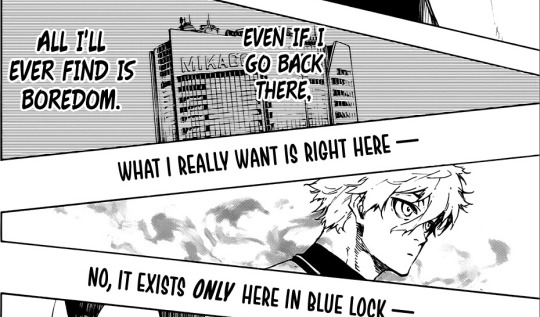
Let’s compare that to Barou, who was similarly broken down and had to crawl his way up again. Barou goes the egoist way and finds his resolve within himself, vowing to double down on his king shtick and devour Isagi back. To Barou, the simple idea of passing a ball is akin to defeat. When he envisions a future of normalcy, with football as something to only watch on tv, Barou’s hunger to reign the field like a king rears its head again and motivates him forward. Reo, instead, never reaches a point where he embraces the series’ trademark selfishness. In fact, he does the opposite. When he vows to step up his game, he doesn’t do it because he thinks he’s the top dog like everyone else. The root of his despair is not a wounded pride, or a desire to prove himself further, to “devour” others back and rise to the top, but just the loss of his fix against boredom. Remember, chasing an exciting life is both Reo and Nagi’s main motivator so far. To put it simply, Reo doesn’t want what awaits him outside of blue lock.
That’s the seed of his actual ego, by the way. Not the Cup, not making Nagi the best, but rather obtaining something by his own merit. But because of his reliance on Nagi (and Nagi’s on his), Reo hasn’t yet reached the point where he can realize this and use the knowledge to better his plays. In that sense, their partnership holds both of them back from exploring their inner motivations and individual strengths further.
And I said that this is instrumental to the kind of story Kaneshiro’s telling because it’s meant to show us all the ways a striker can’t be. This is not a manga where the power of friendship will get you anywhere. No matter how stubborn you get about having it your way, obstacles will materialize in your path and set you back the longer you refuse to play for your own sake.
Yet, Reo doesn't want to advance in the program for the sake of becoming the world's best striker. He never did. He wants to move forward because Nagi left first, and he wants to meet him on the other side (quote, "beyond our dreams"). In other words, to return to being friends, even if he fears that Nagi might've replaced him with Isagi and "forgotten" about him. It doesn't have anything to do with soccer per se. It's more like Reo sees soccer as his chosen tool for self-determination. It was the trial to prove to himself, as well as his father, that his "worth" wasn't handed down to him by circumstance, but was inherent. He could achieve something worthwhile thanks to hard work, and not just reap the benefits of his last name.
And the thing is…If he were literally anyone else, at this point he would’ve already channeled that into individualism, but because it’s Reo, he doesn’t. Despite possessing that seed of egoism, Reo doesn’t water it. His ambition doesn't make him an egoist in the way Ego Jinpachi intended, but instead becomes something that's meant to be carried by two people, contradicting the story.
Reo’s resolve is then always a bit off from falling in line with the rules of blue lock. Even when he gets something right, he does it for the wrong reasons, stumping his development. For example, his resolve after the 3v3 is both a step forward and two steps back. The positive is that he "engraved despair". He faced his shortcomings, realized his powerlessness, and took measures to improve to avoid being left in the dust again. The negative part is that being on his own should've given Reo a taste for real egoism, a hunger for self-reliance, but it does the opposite instead: it makes him long for what he had, and put all his willpower into restoring that partnership however he can. If the issue was that Nagi's improved enough to no longer be satisfied by the level of Reo's plays, then Reo's solution is to make his soccer exciting again in Nagi's eyes to, quote, "be enough to satisfy" him.

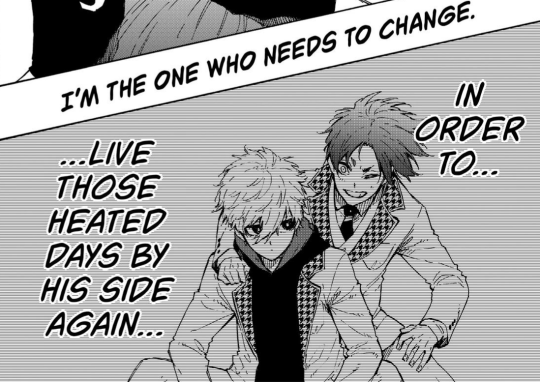
Because of that, however, the moment he has Nagi's trust back, their partnership back, Reo pretty much stops trying to improve. His chameleon style is still a go, but it becomes yet another tool to assist in Nagi's goals. It didn't start that way.
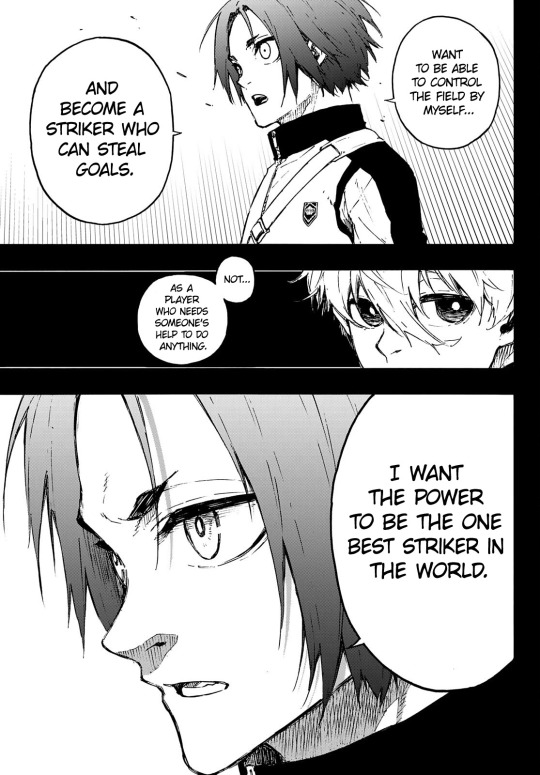
Initially, it was what Reo intended to use to score alone, remember?
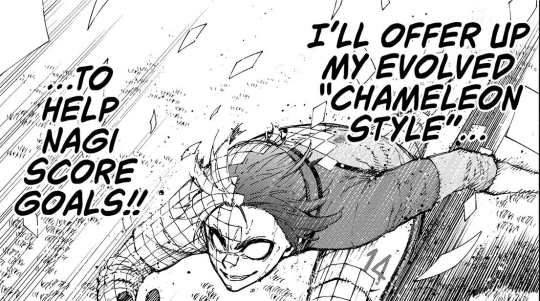
Yet, even after coming up with a style that's solely his, that focuses on his strengths and brings no value to Nagi's, Reo keeps committing to stagnancy. In different but similar ways, both do.
Teamwork and passive codependence are the two things Ego asked all the blue lockers to leave behind, but Nagi and Reo make it their job to bring typical shonen manga dynamics into a series that sets out to break from the norm. And that’s the point!
In this sense, Reo is more at fault than Nagi, who instead realizes that sometimes being apart makes you better, and doesn’t mean the end of your friendship. If I were to pin down Nagi’s role in the narrative, then I’d say he’s meant to show that talent doesn’t equal success without discipline, self-awareness and determination. So the world’s best striker can’t just be good. He needs to know what he’s doing, and when and where he can do it to make the most of every play, since nothing happens by chance on the field. Whereas Reo’s role is that of showing us the mindset of a real striker. Because Reo enters the program without accepting or even understanding Ego’s rules, Reo’s faulty beliefs get challenged at every turn, with the author basically spoonfeeding us the correct path to soccer stardom.
So in the end, since they struggle so much to even understand what they should be doing, their fumbling around makes it so the story goes more into depth about its own themes. Their job is to be incompetent, basically, but in a way that doesn’t rule out eventual growth. They just need to come to terms with the rules of the competition they entered first. So far, they’ve been content to just live in a bubble and coast through the increased stakes of the selection. If they’re serious about their dreams, however (and we’ve established that they are!), they will have to make a choice between what’s comfortable and what’s necessary. Cause, to quote Ego from epinagi chapter 2, in blue lock there’s no place for self-conscious babies who don’t want to ever get their feelings hurt.
So what will they choose? Each other again, or the only way they can make it past blue lock and thus actually chase their dreams?
#Blue lock#Blue lock spoilers#Nagi seishirou#Mikage reo#Seishiro nagi#Reo mikage#Bllk thoughts#And here it is! Sorry for the wall of text. I might go back on this and add more pictures later but rn I'm toast#I need to get this out or else I'll add 4k more lol#I am very normal about those two yes#Nagireo#Reonagi
211 notes
·
View notes
Text
Anuradha
The seventeenth nakshatra (17 out of 27)
Degrees: 3° 20' to 16 °40' Scorpio zodiac
The ruler of the Nakshatra: Saturn (sanks. Shani), governing discipline, structure, and perseverance
Deity: Mitra, the god of friendship and partnership, who represents cooperation, harmony, and compassion.
Nakshatra's guna: tamas (Tamas is associated with inertia, darkness, and materialism. In this case Anuradha has tamas guna primarily due to its ruler Saturn which has a malefic nature)
Anuradha keywords: resilience, growth, purity, cooperation, friendship, loyalty, discipline, determination, organizational skills, leadership, harmony, charisma, ambition, emotional security, empathy, assertiveness, strategy, wisdom, romance, responsibility, transformation, spirituality.
Symbol: The lotus flower signifies purity, resilience, and growth amidst challenges. The archway or triumphal gateway symbolizes success and achievement.
Career options: roles in management, politics, social work, business consultancy, human resources, education, healthcare, law, finance, technology, and logistics are particularly suitable.
Lagna (Asc) in Anuradha: is characterized by a resilient, determined, and disciplined nature. These individuals excel in strategic planning and coordination, often thriving in leadership roles due to their charisma and influential capabilities. With empathy and compassion as natural traits, they are supportive friends and partners. Their strategic and tactical thinking enables them to devise effective plans and adapt to changes. With an interest in mystical and spiritual pursuits, they seek profound self-understanding. Ambitious and goal-oriented, they tend to set high standards and are driven to succeed. Loyalty and trustworthiness define their character, making them reliable and dependable in all relationships. NOTE: In order to understand how strong and harmonious ASC is, we need to evaluate the strength and position of Saturn as the ruler of this nakshatra, as well as any planetary aspects to it and the first house in general (if there are any planets).
Sun in Anuradha: makes the individuals bestowing strong leadership skills. They have a natural ability to lead and inspire others, often earning respect from peers, and taking charge in difficult situations. Like the lotus flower symbol of Anuradha, these individuals can thrive in challenging conditions, displaying resilience and strength. The influence of Saturn, the ruling planet of Anuradha, instils a sense of discipline and responsibility. These individuals are methodical and diligent in their approach to work and life. Anuradha Sun natives seek balance and harmony in their relationships and surroundings. They value cooperation and strive to maintain peaceful interactions. This placement often brings a deep interest in spiritual and philosophical matters. These individuals seek deeper meaning and understanding in life. They are introspective and reflective, often engaging in self-analysis and personal growth.
Moon in Anuradha: suggests individuals who possess a deep emotional intensity and a strong desire for meaningful connections. They are empathetic and compassionate, often nurturing and supporting those around them. These individuals may have a magnetic presence and an intuitive understanding of human emotions, making them skilled at fostering harmony and cooperation in their relationships. Moon in Anuradha natives are also resilient and determined, able to navigate through life's challenges with grace and strength. However, they may experience periods of emotional upheaval or inner turmoil, as the Moon's influence can intensify feelings and sensitivities. It's essential for them to cultivate emotional balance and self-awareness, allowing them to harness their emotional depth for personal growth and spiritual development.
Mercury in Anuradha: signifies individuals with a strategic and diplomatic communication style. They possess analytical prowess and persuasive charm, enabling them to navigate complex situations with finesse and tact. These individuals excel in negotiation and problem-solving, often finding creative solutions to challenges. Mercury's influence here also enhances their intellectual curiosity and interest in uncovering hidden truths and mysteries. They may have a keen eye for detail and a sharp analytical mind, making them adept at research and analysis. However, they may need to guard against tendencies towards manipulation or deceit, as Mercury in Anuradha can amplify communication challenges related to trust and honesty. Altogether, these individuals are resourceful, adaptable, and intellectually curious, leveraging their communication skills to achieve their goals and foster harmonious relationships.
Mars in Anuradha: indicates individuals with a determined and resilient approach to achieving their goals. They possess intense drive and ambition, coupled with a strategic mindset, enabling them to overcome obstacles and succeed in their endeavors. Mars here imparts strong leadership qualities, as well as a competitive spirit, making them formidable in competitive environments. However, they may need to temper their assertiveness with diplomacy, as Anuradha's influence encourages cooperation and harmony. These individuals may also exhibit a passionate and intense nature in their relationships, seeking deep connections and loyalty from their partners. Overall, Mars in Anuradha natives are dynamic and resourceful people who thrive when channelling their energy into focused and purposeful action.
Venus in Anuradha: indicates romantic at heart individuals. They express affectionate gestures towards their loved ones. They possess social fineness and charm, making them well-liked and admired in social circles. They have a knack for creating a pleasant atmosphere wherever they go. With a desire for harmony, they often act as peacemakers in conflicts, using their diplomatic skills to reconcile differences and promote understanding. They value loyalty and commitment in relationships, striving to maintain long-term bonds built on trust and mutual respect. Beneath their charming exterior, they possess emotional depth and sensitivity, allowing them to connect deeply with others on an emotional level.
Jupiter in Anuradha: imbues individuals with a deep sense of wisdom, morality, altruism and spiritual insight. They possess a philosophical outlook on life and a profound understanding of ethical principles. Jupiter's influence here enhances their capacity for generosity, compassion, and benevolence, prompting them to seek opportunities to uplift and support others. These individuals may have a natural inclination towards higher learning, philosophy, or spirituality, and they often excel in teaching, counselling, or guiding others. Jupiter in Anuradha encourages them to expand their horizons through cultural experiences, travel, or intellectual pursuits, fostering a broader perspective on life. Their positive and optimistic nature inspires confidence and trust in others, making them effective leaders and mentors.
Saturn in Anuradha: bestows individuals with a disciplined and determined approach to achieving their goals. They possess a strong sense of responsibility and a commitment to hard work, often enduring challenges with patience and perseverance. Saturn's influence here fosters a deep sense of introspection and self-discipline, prompting them to seek self-improvement and personal growth. These individuals may face trials and obstacles in their path, but they emerge stronger and more resilient as a result. Saturn in Anuradha encourages them to build stable and enduring foundations in their lives, emphasizing the importance of integrity, honesty, and reliability. While they may face delays and setbacks, their steadfast determination ultimately leads to success and fulfilment, especially in endeavours that require long-term planning and strategic thinking.
Rahu in Anuradha: brings an intense and transformative energy to individuals' lives. These individuals may experience a strong desire for power, recognition, and material success, often pursuing their ambitions with relentless determination. Rahu's influence here can lead to a fascination with the occult, mysteries, and hidden knowledge, driving them to explore unconventional paths and delve into esoteric subjects. However, they may also face challenges related to secrecy, manipulation, and deception, as Rahu tends to amplify desires and obsessions. It's essential for them to channel this energy constructively, avoiding shortcuts or unethical means to achieve their goals. With self-awareness and discipline, they can harness Rahu's energy in productive ways, leading to profound personal growth and transformation. Ultimately, Rahu in Anuradha encourages individuals to confront their deepest desires and fears, facilitating spiritual evolution and self-realization.
Ketu in Anuradha: signifies individuals with a deep sense of introspection and spiritual insight. They possess a natural inclination towards inner exploration and self-discovery, seeking to uncover hidden truths and transcend worldly attachments. Ketu's influence here encourages them to detach from material desires and embrace simplicity and inner peace. These individuals may have a profound understanding and acceptance of metaphysical concepts and esoteric knowledge, often drawn to spiritual practices or mystical pursuits. However, they may also experience periods of isolation or existential questioning, as Ketu prompts them to detach from conventional societal norms and expectations. They need to cultivate patience and acceptance, trusting in the process of spiritual evolution and surrendering to the guidance of their inner wisdom.

104 notes
·
View notes
Note
Building on this point I made way back in last year December, it's interesting just how much the shaky situation of the Psychonauts organization could be read as a direct parallel to the Fall of Grulovia. Both of them involve groups/societies losing their "heart", so to speak, as a result of horrors caused by a Grulovian driven over the edge.
In the Psychonauts' case, it was losing Lucrecia, Ford, and Helmut that lead to the Psychonauts' foundation effectively without the soul that made the Psychonauts what it was meant to be (to expand the frontiers of knowledge regarding the human mind). Thus, all that remained was the shell and whatever fragments remained of the Psychic Seven with Otto, Compton, Cassie, and Bob. Once they began to fall apart, the Psychonauts was only a fraction of what it used to be despite the changes.
In the case of Grulovia, it'd be easy to claim that the Maliks were the "heart" of Grulovia, but I'd argue that it'd be more accurate to say that it was the regular citizens, the people who Grulovia's royal family should have nurtured and prospered. But the Maliks had been leeching them dry for years, and Theodore's decision to manipulate Lucrecia only lead to the final nail in the coffin with the Deluge of Grulovia.
In both cases, the birth of Maligula was both the "birth" of the Psychonauts as an organization, but the death of the Psychonauts as a group of friends and people driven by their heart towards a noble goal, replaced by an effectively broken shell that was held together by forward momentum and talented people who tried to keep things going. And likewise, the birth of Maligula heralded the death of Grulovia, with the leeches (Maliks) who caused the whole mess scurrying away into hiding.
And then it's telling that what began the process of healing that heart involved another Grulovian playing a part to make things right.
Raz and Gristol in this regards parallel each other, as they both narratively play a role in trying to save the heart of their respective groups. But whereas Raz ultimately achieves this by helping to heal the original wound both in the Aquato family and the Psychic Six, Gristol did not and could not do so.
This is because Gristol foolishly imposes himself as being the "heart" of Grulovia, much like the rest of his family. Lacking any self-awareness and introspection, he thus only ensured that he'd be doomed to make the same devastating mistakes that led to Grulovia falling in the first place, and nearly dooming the remnants of the Psychonauts as well.
Ford in many ways factors into this as well, as while the Maliks certainly played a part in the devastation, he basically tried to "fix" the heart of the Psychonauts and bring back Lucrecia at any cost, only for the costly nature of his mistakes leading to his own mind being shattered, Lucrecia stuck in a false identity, and Helmut trapped for 2 decades as a brain in a jar.
And the end results speak for themselves. The Psychonauts and Grulovia being seen as shadows of their former selves. The Psychonauts unable to help its own agents in mental crises, Whispering Rock's children suffering from their own troubles that go unaddressed in the first game, etc. And Grulovia a frozen wasteland whose only chance of being "fixed" lies in the hands of the very people who leeched and drained it dry, before condemning it to a watery and frozen grave while fleeing from their costly mistakes.
I find Gristol's fixation on Ford especially fascinating in this regard bc you can draw parallels between the two as trying to fix these dire straights in ways that involve a lot of mental manipulation, whether it's Gristol's more real-world manipulative tactics or it's Ford's use of the astralathe. While Ford has much more well meaning intentions it can't be denied that he pulled a lot of selfish moves in the process, like not going to get his friends' help since he must've assumed they'd never agree to such a wildly unsafe solution to the problem.
For some reason the image that always flashes in my mind when these parallels between the Psychonauts (org) and Grulovia are drawn is whenever you go to Fatherland Follies and see that show room where Ford is like on the front lines doing his EVIL psychonauts treachary on top of his Ford Plane. Like it or not once Ford and friends agreed to stop Maligula they entered the World Stage and they have lasting world-wide images built up around them afterward for better or worse.
I've always liked that in the end the thing that saved Lucy and brought her back/allowed her to snip Maligula back into the subconcious of her mind, it was Raz, it was the family she wanted so much to protect but got maniupulated into hurting by the Maliks.
The Psychonauts (org) being set on the path to hopefully saving themselves from becoming even worse than that shell of their former selves fascinates me because despite how hyped up it is, they're honestly pretty early on into their life as an organization. Like, taking everything at face value, the Psychonauts are only a 20 year old organization, that's like, nothing in the grand scheme of things so far. They've definitely already been making their mark but now I think they have the next generation of agents in a good place to eventually take things over, because the old guard of the Psychic 7 has their heads on more straight and can guide the growth/rebuilding/restructuring a lot more before they're gone in like another 20-30 years.
27 notes
·
View notes
Text
Digital Marketing Strategy
Set Clear Goals and Objectives: The first step in creating a digital marketing strategy is to define clear goals and objectives. These goals should be specific, measurable, attainable, relevant, and time-bound (SMART). Examples include increasing website traffic, generating leads, improving brand awareness, or driving online sales.
2. Understand Your Target Audience: To effectively reach and engage your target audience, it's important to understand their demographics, interests, behaviors, and pain points. Conduct market research, analyze customer data, and create buyer personas to gain insightful information about your target audience. This will help you tailor your digital marketing efforts to resonate with them.
3. Choose the Right Digital Channels: Identify the digital channels that are most relevant to your target audience and align with your marketing goals. Common digital channels include websites, search engines, social media platforms, email marketing, content marketing, mobile apps, and online advertising. Each channel has unique characteristics and advantages, so choose the ones that best suit your business and audience.
4. Develop Content Strategy: Content is at the heart of digital marketing. Create a content strategy that focuses on delivering value to your target audience. Plan and produce high-quality content that aligns with their interests, needs, and preferences. This can include blog articles, videos, infographics, eBooks, webinars, and social media posts. Consistency and relevance are key to establishing thought leadership and building trust with your audience.
5. Optimize for Search Engines: Implement search engine optimization (SEO) strategies to improve your website's visibility in search engine results. Conduct keyword research to identify relevant search terms and optimize your website's on-page elements, such as meta tags, headings, and content. Create high-quality backlinks from reputable websites to boost your website's authority.
6. Leverage Social Media: Utilize social media platforms to connect with your audience, build brand awareness, and foster engagement. Identify the platforms where your target audience is most active and create compelling content tailored to each platform. Engage in conversations, respond to comments, and encourage user-generated content to cultivate a sense of community and brand loyalty.
7. Implement Email Marketing: Email marketing remains an effective way to nurture leads and engage with existing customers. Develop an email marketing strategy that includes personalized and segmented email campaigns. Provide valuable content, offers, and promotions to your subscribers, and automate email sequences to streamline your communication.
8. Monitor, Measure, and Adjust: Regularly monitor the performance of your digital marketing efforts using analytics tools. Track key performance indicators (KPIs) such as website traffic, conversion rates, engagement metrics, and ROI. Use the insights gained to identify areas for improvement and make data-driven adjustments to optimize your strategy.
9. Stay Updated and Evolve: The digital marketing landscape is constantly evolving. Stay updated with the latest trends, technologies, and industry best practices. Experiment with new channels and tactics to reach your audience. Continuously adapt your strategy based on market changes and feedback from your audience.
10. Evaluate and Refine: Regularly evaluate the effectiveness of your digital marketing strategy against your goals. Identify successes, challenges, and areas of improvement. Refine your strategy based on the insights gained to ensure continuous growth and success.
11. In summary, a well-rounded digital marketing strategy involves setting clear goals, understanding your audience, choosing the right channels, creating valuable content, optimizing for search engines, leveraging social media and email marketing, monitoring and measuring performance, staying updated, and evaluating and refining your approach. By following these steps, businesses can effectively harness the power of digital marketing to achieve their objectives and drive sustainable growth.

19 notes
·
View notes
Text
Building Success with an Advanced Marketing Framework
Competitive digital world, understanding and implementing an Advanced Marketing Framework is crucial for brands aiming to capture, retain, and grow a strong customer base. A well-structured framework provides the roadmap for navigating dynamic customer needs, optimizing marketing efforts, and scaling business growth. By analyzing data, segmenting audiences, and delivering the right message at the right time, brands can engage customers and drive conversions effectively.
Understanding the Concept of an Advanced Marketing Framework
An Advanced Marketing Framework is a structured approach that combines strategies, tools, and analytics to enhance marketing effectiveness. It goes beyond traditional marketing methods, diving deeper into data-driven insights, real-time adjustments, and customer-centric tactics. Unlike basic frameworks, an advanced one integrates sophisticated techniques such as machine learning, behavioral segmentation, and cross-channel analysis to optimize results.
Creating an Advanced Marketing Framework is about harmonizing various elements, including customer data, brand messaging, channels, and feedback mechanisms, to offer a more cohesive experience across touchpoints. This approach increases brand loyalty and facilitates a seamless buyer journey from awareness to purchase.
Key Components of an Advanced Marketing Framework
Building an Advanced Marketing Framework requires more than just a few tweaks to traditional methods; it needs a holistic structure encompassing essential components:
1. Customer-Centric Approach
A customer-centric framework prioritizes the needs, desires, and behaviors of the target audience. By analyzing demographic, psychographic, and behavioral data, businesses can develop personalized campaigns that resonate with customers on a deeper level.
2. Data-Driven Insights
Data analytics is foundational to an Advanced Marketing Framework. With tools like Google Analytics, HubSpot, or more complex machine learning models, marketers can gain insights into customer behavior, engagement patterns, and conversion metrics. Leveraging data enables the fine-tuning of campaigns to maximize ROI and make informed decisions about where to allocate marketing resources.
3. Content Strategy and Personalization
Content remains a critical piece in engaging audiences. The Advanced Marketing Framework relies on content that is not only relevant but also tailored to individual customer segments. Personalization, such as dynamic emails, curated recommendations, or personalized landing pages, drives higher engagement and nurtures customer loyalty.
4. Omnichannel Marketing
In an Advanced Marketing Framework, omnichannel marketing ensures consistency across platforms, from email to social media to in-store experiences. Integrating channels allows for seamless transitions between touchpoints, enhancing the customer experience. This continuity helps brands reinforce messaging, nurture leads, and build stronger relationships with customers.
5. Automation and AI-Driven Strategies
Automation and artificial intelligence (AI) are game-changers in advanced marketing. Automated workflows can handle repetitive tasks, like sending follow-up emails or reminding customers about abandoned carts. AI-driven analytics provide deep insights into customer trends and forecast future behavior, making campaigns more targeted and efficient.
6. Continuous Optimization and Real-Time Adjustments
Unlike traditional frameworks, an Advanced Marketing Framework isn’t static. It requires constant optimization and real-time updates based on data analytics and customer feedback. A/B testing, conversion rate optimization, and performance monitoring are essential to ensure that campaigns are achieving their objectives and maximizing engagement.
7. Feedback and Adaptability
Customer feedback is an integral part of the Advanced Marketing Framework. Whether it’s through surveys, reviews, or social media comments, feedback helps brands understand customer sentiment, address concerns, and improve offerings.
Benefits of Implementing an Advanced Marketing Framework
Integrating an Advanced Marketing Framework offers substantial benefits:
Improved Customer Engagement: Personalized, data-driven strategies capture customer attention and keep them engaged across channels.
Higher Conversion Rates: By targeting the right audience with the right message, brands can enhance conversion rates and customer satisfaction.
Enhanced Efficiency: Automation and AI streamline operations, freeing up resources for creative, high-impact work.
Data-Backed Decisions: A reliance on data means that marketing decisions are well-informed and optimized for results.
Competitive Edge: Brands using an Advanced Marketing Framework stay ahead by adapting to customer preferences and market changes faster.
Getting Started with Your Advanced Marketing Framework
Creating and implementing an Advanced Marketing Framework might seem overwhelming, but starting with small steps can make a significant impact. Begin by clearly defining your target audience, outlining measurable objectives, and selecting the tools necessary for data analysis and automation.
Next, focus on omnichannel marketing strategies, ensuring your brand message is consistent across platforms. From here, experiment with content personalization and automation to enhance engagement. Remember to continually monitor and optimize your approach based on performance data and customer feedback.
2 notes
·
View notes
Text
Helluva Boss: Moxxie's Struggles
Background and Family


Moxxie has endured a life marred by trauma and neglect. His father Crimson is a domineering crime lord in the Greed Ring of Hell, who harbored disdain for his son's sensitive nature. This contempt manifested in emotional and physical abuse, as well as an attempt to forcibly marry Moxxie off for financial gain, disregarding his existing marriage to Millie. On the other hand, Moxxie's mother was a saint and showered him with love in his early years, but her untimely death left him without a nurturing figure during his formative years.
Moxxie's Relationship with His Peers

In his adult life, Moxxie's interactions with colleagues and acquaintances have been far from supportive. He frequently endures ridicule and disparagement from his boss, Blitzo, and co-worker Loona. Even Millie, his wife, often fails to defend him against these attacks. This consistent pattern of belittlement and exclusion has only exacerbated Moxxie's need for approval and acceptance, leading to a deep-seated sense of isolation and a lack of platonic relationships.
Moxxie's Behavior in "Unhappy Campers"



Moxxie's actions, as frustrating as it is, makes a depressing amount of sense when you consider the circumstances of his life. From childhood to early adulthood, he was kept isolated and under Crimson's thumb, which implies that he had no friends growing up, with the only person showing him genuine affection having been killed by his father when he was barely out of toddlerhood. In the present day, he receives the lion's share of verbal and physical abuse and humiliation from Blitzo, Loona and other people alike, not to mention that his in-laws clearly don't like him, but just tolerate him for Millie's sake. In other words, even after meeting Millie, he's clearly not received much in the way of platonic love and appreciation in his life.
Having been controlled and isolated by his father, Moxxie's desperate craving for approval and affection led him to adopt a "popular girl" persona in a misguided attempt to gain popularity and make Blitzo proud. This persona, however, clashes with his true nature and fails to resonate with those around him, further damaging his self-esteem.
Identity and Self-Worth
Moxxie's struggle to be himself is rooted in a lifetime of rejection and a lack of appreciation for his genuine qualities. His affinity for theatre and movies may have influenced his decision to emulate the "popular girl" archetype, a trope he mistakenly believes will earn him the admiration he so desperately seeks. His jealousy towards Millie's natural ability to be loved for who she is only shows his own insecurities and the negative impact of his past on his self-perception.
He even doubles down on trying (and failing) to act like a teenage girl despite it clearly not working out for him. Why doesn't he change tactics or even try to be himself when he sees that it works wonders for Millie?
Well, it's not like he's received much in the way of appreciation for being himself before, has he? And while it doesn't excuse or justify his behavior, it might explain why he gets jealous of Millie instead of happy for her: He sees her effortlessly blending in and becoming loved by all simply by being herself whereas he seems to end up becoming a pariah or a punching bag no matter where he is and what he does. It must've done a number on his self-esteem
Acceptance and Character Development


The effect of Moxxie's traumatic upbringing and ongoing mistreatment is a severely undermined self-esteem. His inability to receive validation for his true self has left him in a state of constant overcompensation, which often leads to further alienation and ridicule. This cycle of seeking approval and facing rejection has become a defining struggle in Moxxie's life, influencing his actions and relationships.
Despite the adversity he faces, Moxxie's quest for acceptance and validation is a poignant reflection of his resilience. His experiences, while heartbreaking, provide a deeper understanding of his character and the complexities of seeking self-worth in a world that has been consistently unkind.
Despite his job as an assassin, Moxxie is a demon who shows a high level of empathy and sensitivity. This contrasts sharply with the ruthless nature of his colleagues and the infernal setting of Hell. Moxxie's reluctance to harm the innocent and his moral compass often make him the target of ridicule and abuse, both from other characters and the enitre universe itself.


Throughout the series, Moxxie undergoes a journey of personal growth, learning to carry out his duties as a hitman with less hesitation. Despite this development, the show continues to use him as a comedic foil, subjecting him to physical harm and emotional trauma.
His competence with firearms and his successful missions with his wife Millie indicate that he is a valuable member of the I.M.P. assassin team, despite the frequent setbacks he faces. Moxxie's background as a former mob prince and his aspirations as a musician add layers to his character, suggesting a depth beyond his role as the 'punching bag' of the show.
#helluva boss#moxxie#helluva boss moxxie#hazbin analysis#hazbin hotel#helluva boss analysis#vivziepop
15 notes
·
View notes
Text
by Colonel (res.) Dr. Eran Lerman
It is this intensely nurtured image of heroism and an indomitable spirit, and the specific historical context, which lends deep meaning to the growing numbers of Hamas men who choose surrender over death. Aspects of the IDF operations in both Khan Younis and the major repeat raid on Shifa Hospital (where hundreds were reportedly detained) contributed to the achievement of this result. In some of the cases, the surrender was also documented by media elements.
All this has immediate tactical benefits:
The signs of demoralization and loss of fighting spirit in the enemy ranks in key places can lead to a similar effect in other sectors.
The surrender of armed men clearly reduces the extent of the actual fighting while expanding the scope of operations – albeit at the cost of having to assign troops and resources for the transportation and detention of those detained.
Above all, the interrogation of the terrorists detained can produce qualitative intelligence on their strengths and deployment, particularly on the system of tunnels. The latter has turned out to be far more extensive and ambitious than the picture obtained before the war through other collection channels.
At the operational level – aimed at achieving the war’s overall goals – Israel is holding a steadily growing number of Hamas operatives also as a lever to negotiate the release of all remaining hostages and hasten the organizational collapse of the organization’s command structure.
Still, the most far-reaching implication is at the symbolic level: effectively debunking the myth of sacrifice, nurtured by the “Axis of Resistance” in recent decades, by putting a spotlight on the patterns of surrender. This can serve as a message both to the Gazans themselves, whose life Hamas was willing to sacrifice unhesitatingly and in great numbers, and to much wider circles in the Arab and Muslim world where this myth has taken hold.
5 notes
·
View notes
Text

📈 Discover the Power of Digital Marketing! Our tailored digital marketing services are designed to help businesses achieve remarkable growth. This graph showcases the increasing Return on Investment (ROI) that our strategies can deliver.
🔍 Key Insights:
Steady Growth: The upward trend in ROI over time demonstrates the effectiveness of our digital marketing approach. Each peak represents a successful campaign or optimized marketing effort.
Strategic Milestones: Highlight significant periods of growth, showcasing how our comprehensive strategies drive real results.
🎯 Understanding Our Success:
Target Audience Expertise: We identify and understand your target audience, ensuring our strategies resonate with their needs and behaviors.
Effective Strategies: Our proven tactics include personalized marketing, targeted campaigns, and data-driven decisions that consistently boost ROI.
📊 Our Approach:
Analytics Tools: We utilize cutting-edge tools like Google Analytics to track website traffic and user behavior, enabling smarter, data-informed decisions.
Customer Insights: By harnessing market research and analytics, we continually refine our approach to enhance satisfaction and drive better results.
🌟 Our Services Include:
SEO Optimization: Improve your search engine rankings and drive organic traffic.
Content Marketing: Create engaging, valuable content that resonates with your audience.
Social Media Management: Build and maintain a strong social media presence.
PPC Advertising: Maximize ROI with targeted pay-per-click campaigns.
Email Marketing: Develop effective email campaigns to nurture leads and drive conversions.
🚀 Future Focus: Our commitment to innovation and customer-centric strategies ensures continuous growth and elevated ROI for your business.
Ready to take your digital marketing to the next level? Contact us today and let's achieve great results together! 🚀📞
WhatsApp: https://wa.me/918985992323
#digital marketing#maximizeroi#marketing strategy#business growth#seo#contentmarketing#business analytics#speelertechnologies#speeler
2 notes
·
View notes
Text
The concept of indoctrinating children with fear as a parenting approach revolves around using fear as a means of control. It's a strategy where parents use the emotion of fear to influence their children's behavior and decisions. This approach appears effective initially, as children might comply out of fear of consequences. However, there are deeper implications to consider.
When children grow up in an environment where fear is the primary motivator, they may eventually come to realize that things they were afraid of are not as menacing as once thought. This realization can weaken the effectiveness of fear-based tactics, making it harder for parents to maintain control over their children's actions.
To counter this, parents might escalate their tactics, resorting to even harsher punishments or stricter rules in an attempt to regain control. This cycle can lead to a negative dynamic between parents and children, with fear at its core, and even abuse.
Research indicates that living in a state of constant fear and stress can be harmful to both physical and mental health. Stress triggers a physiological response known as the "fight or flight" response, which is meant to protect us from immediate danger. However, when this response becomes chronic due to prolonged exposure to fear, it can lead to various health issues, including anxiety and other emotional disorders.
Chronic stress impacts the brain. It diverts blood flow away from the part of the brain responsible for logical thinking, reasoning, and decision-making. This makes it difficult for individuals to process information effectively or to make rational choices. Consequently, individuals caught in a cycle of fear-based parenting may find it difficult to think clearly and make good decisions, perpetuating the cycle further.
In summary, while fear-based parenting might yield short-term compliance, its long-term effects on children's well-being and their ability to make informed decisions suffers greatly. It's important for parents to consider healthier approaches that nurture trust, open communication, and the emotional stability of their children.
#fear#fear based parenting#parenting#neurodivergent#adhd#asd#Asperger’s#gentle parenting#be the change#ptsd#trauma#brainwashing#stockholm syndrome#abuse#emotional abuse#feelings#empath#heyoka#aspie things#aletheiaseeker#Kipsic
16 notes
·
View notes
Text
Unveiling Lucrative Career Paths: Your Guide to Digital Marketing Careers
In today's rapidly evolving digital landscape, the field of marketing has undergone a significant transformation, offering a plethora of exciting career opportunities in digital marketing. With the proliferation of online platforms and the increasing reliance on digital channels for marketing efforts, professionals in this field are in high demand. Whether you're a seasoned marketer looking to transition into the digital realm or a recent graduate eager to explore new career paths, the world of digital marketing holds immense promise. Let's delve into the diverse array of career options available in digital marketing, providing insights into each role's responsibilities, skills required, and potential for growth.

SEO Specialist
SEO specialists focus on optimizing websites to improve their visibility in search engine results pages (SERPs). They conduct keyword research, optimize website content, and implement technical SEO strategies to enhance organic traffic and rankings. SEO specialists must stay updated on search engine algorithms and best practices to ensure websites remain competitive in the ever-changing digital landscape.
Social Media Manager
Social media managers are tasked with managing a brand's presence on social media platforms such as Facebook, Instagram, Twitter, and LinkedIn. They create engaging content, interact with followers, and analyze social media metrics to drive engagement and brand awareness. Social media managers must possess excellent communication skills, creativity, and a deep understanding of social media platforms and trends.
Content Marketing Manager
Content marketing managers oversee the creation and distribution of valuable, relevant content to attract and retain a target audience. They develop content strategies, manage content calendars, and collaborate with writers and designers to produce high-quality content. Content marketing managers must possess strong writing skills, creativity, and a strategic mindset to effectively engage audiences and drive business objectives.
PPC Specialist
PPC specialists manage pay-per-click advertising campaigns on platforms like Google Ads and Bing Ads. They create ad copy, set up targeting parameters, and monitor campaign performance to maximize ROI and drive conversions. PPC specialists must possess analytical skills, attention to detail, and a deep understanding of PPC platforms and advertising principles.
Email Marketing Specialist
Email marketing specialists design and execute email marketing campaigns to nurture leads and drive conversions. They segment email lists, create compelling email content, and analyze email performance metrics to optimize campaign effectiveness. Email marketing specialists must possess strong copywriting skills, attention to detail, and a deep understanding of email marketing best practices.
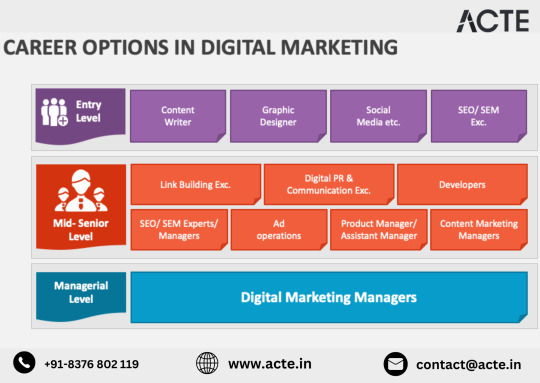
Digital Analytics Specialist
Digital analytics specialists analyze data from various digital marketing channels to provide insights and recommendations for optimizing marketing strategies. They utilize tools like Google Analytics and Adobe Analytics to track website traffic, user behavior, and campaign performance. Digital analytics specialists must possess strong analytical skills, attention to detail, and a deep understanding of digital analytics platforms and methodologies.
E-commerce Marketing Manager
E-commerce marketing managers focus on driving sales and revenue through digital channels for online retail businesses. They develop strategies for product promotion, optimize product listings, and implement tactics to increase conversion rates. E-commerce marketing managers must possess strong analytical skills, strategic thinking abilities, and a deep understanding of e-commerce platforms and consumer behavior.
Influencer Marketing Manager
Influencer marketing managers oversee influencer marketing campaigns, collaborating with influencers to promote products or services to their followers. They identify suitable influencers, negotiate partnerships, and measure campaign performance. Influencer marketing managers must possess strong relationship-building skills, negotiation abilities, and a deep understanding of influencer marketing trends.
Digital Marketing Consultant
Digital marketing consultants provide strategic guidance and expertise to businesses looking to improve their digital marketing efforts. They assess current strategies, identify areas for improvement, and develop customized solutions to help businesses achieve their marketing goals. Digital marketing consultants must possess strong communication skills, analytical abilities, and a deep understanding of digital marketing principles and best practices.
Conclusion
In conclusion, the field of digital marketing offers a multitude of exciting career opportunities for individuals with diverse skills and interests. Whether you're passionate about analytics, creativity, or strategy, there's a role in digital marketing to suit your talents. By honing your skills, staying updated on industry trends, and continuously learning and adapting, you can carve out a successful and rewarding career in the dynamic world of digital marketing. So, if you're ready to embark on an exciting journey in the digital realm, explore the various career paths in digital marketing and unleash your potential in this ever-evolving field.
#tech#training#digital marketing#digital marketing company#digital marketing course#email marketing#online marketing#search engine optimization#seo#seo services
3 notes
·
View notes
Text
Essential Marketing Tactics for the Success of Your Indian Dropshipping Store
Are you struggling to find the ideal marketing service for your dropshipping store in India? Marketing is essential for the success of any business, particularly in today’s competitive e-commerce world. In this blog post, we’ll look at where you may receive efficient marketing support for Indian dropshipping companies.
Top Platforms for Marketing Support for Indian Dropshipping Stores
Social media networks like Facebook, Instagram, and Pinterest are effective tools for promoting dropshipping products to a large audience. Indian dropshipping stores can effectively use social media marketing to increase sales by providing compelling content, executing targeted ads, and cooperating with influencers.
Influencer Marketing: Collaborating with influencers who have a strong following in your niche can significantly impact the success of your dropshipping store. By partnering with influencers to promote your products, you can reach a larger audience and build credibility with potential customers.
Search Engine Optimization is important for improving the visibility of your dropshipping store in search engine results. By optimizing your website with relevant keywords, creating high-quality content, and building backlinks, you can drive organic traffic to your store and increase conversions.
Email marketing remains one of the most effective channels for engaging with customers and driving sales. By sending personalized emails, promoting exclusive offers, and nurturing leads, Indian dropshipping stores can build long-lasting relationships with their audience.
Content Marketing: Creating valuable and informative content can help Indian dropshipping stores establish authority in their niche and attract a loyal customer base. By publishing blogs, videos, and other content that resonates with your target audience, you can drive traffic to your store and improve brand recognition.
To summarize, getting the correct marketing support for your Indian dropshipping business is critical to generating development and success. With the right marketing support, your Indian dropshipping business may succeed in the competitive e-commerce sector.
3 notes
·
View notes
Text
The Ultimate Guide to Buying Sales Leads: Maximizing ROI

In the fast-paced universe of B2B sales, unlocking the potential of B2B Database Leads has become more than a strategic choice – it's a necessity. At the epicenter of this transformative journey lies the mastery of B2B Lead Generation and Sales Prospecting, twin forces that possess the ability to reshape business narratives, forge a robust Sales Funnel, and elevate Business Development to soaring heights. Yet, within the vast expanse of lead acquisition possibilities, one crucial question persists: How can you ensure that your investment in Sales Leads materializes into a considerable Return on Investment (ROI)? This comprehensive guide unveils seven pivotal waypoints that collectively form the backbone of an impactful lead buying strategy, empowering you with insights and tactics to navigate this realm with confidence and foresight.
DOWNLOAD THE INFOGRAPHIC HERE
1. Understand Your Target Market
The quest for successful B2B Lead Generation begins with delving deep into the contours of your target market. Beyond the confines of demographic data, embrace a panoramic understanding of their behavioral traits, preferences, and pain points. These insights morph into a compass, directing you towards a curated list of leads that resonates with your audience's aspirations. Every layer of insight unearthed about your prospects enhances the precision and relevance of your leads, transforming your Sales Prospecting into a personalized dance of effectiveness.
2. Choose a Reputable B2B Data Provider
Amid the plethora of lead acquisition avenues, not all B2B data providers radiate the same level of excellence. This phase underscores the importance of meticulous research and discernment. Peer beneath the surface to unearth providers celebrated for their precision in delivering contact data. Real-world case studies and authentic customer testimonials emerge as your guiding beacons, enabling you to assess the authenticity and dependability of potential providers. For it is on the bedrock of dependable data that the edifice of your Sales Leads strategy stands tall.
3. Opt for Verified Leads
Amid the allure of quantity, the true magic unravels when you opt for Verified Leads. These are the jewels that have been meticulously validated and authenticated, standing as a testament to accuracy and relevance. Choosing verified leads is akin to investing in treasures rather than trinkets; each lead carries the potential for a transformative conversion. The thorough curation process empowers your Sales Outreach endeavors with the promise of higher success rates.
4. Ensure CRM Integration
Envision your lead acquisition journey as a grand tapestry, with CRM integration acting as the thread weaving every element seamlessly. The integration of your newly acquired Sales Leads into your Customer Relationship Management (CRM) system orchestrates a harmonious flow of data. This integration sets the stage for the efficient management and nurturing of leads, where Sales Prospecting converges with the nurturing process, giving rise to the symphony of conversion.
youtube
5. Prioritize Lead Scoring
Lead Scoring emerges as your compass, guiding you through the labyrinth of prospects. By evaluating potential customers based on their perceived value to your organization, you allocate your resources judiciously. Elevating leads with higher scores is akin to focusing your spotlight on the stars of the show. This strategic choreography streamlines your Sales Prospecting endeavors, ensuring that your efforts are channeled where the potential for substantial returns is at its zenith.
6. Evaluate Industry Trends
In the vibrant landscape of B2B Sales, staying attuned to industry trends and emerging markets is the hallmark of a visionary. The interplay between these trends and your lead acquisition strategy is pivotal. A comprehensive Sales Leads database emerges as your arsenal, spanning across diverse industries and markets. This inclusive approach ensures that your B2B Sales strategy remains versatile and adaptable, poised to navigate shifting tides.
7. Measure and Optimize
The culmination of your lead acquisition journey is not an endpoint but the beginning of a continuous refinement process. Measurement becomes your guiding star, illuminating your path in the intricate realm of lead acquisition. Metrics such as conversion rates, cost per lead, and overall ROI emerge as your guiding lights. These metrics transform into wellsprings of insight, steering your iterative optimization efforts. Through this process, your lead buying strategy evolves into a finely tuned instrument of success.
In the domain of B2B Sales, the acquisition of Sales Leads isn't a transaction but an investment in the very core of your business's evolution. "The Ultimate Guide to Buying Sales Leads: Maximizing ROI" is your compass, guiding you toward not merely a profitable investment, but an empowering transformation. Energize your Sales Funnel, breathe life into Business Development strategies, and redefine the art of Sales Prospecting armed with insights that possess the potential to reshape your trajectory. Armed with knowledge, you embark on a journey of growth and empowerment.
#AccountSend#B2BLeadGeneration#B2B#LeadGeneration#B2BSales#SalesLeads#B2BDatabases#BusinessDevelopment#SalesFunnel#SalesProspecting#BusinessOwner#Youtube
13 notes
·
View notes
Text
9 Highly Effective Lead Generation Strategies for Startups
Discover 9 powerful lead generation strategies tailored specifically for startups, designed to propel your business growth and attract valuable leads. From content marketing and email campaigns to social media advertising and search engine optimization, these strategies are proven to drive engagement and conversions. By leveraging targeted content, optimizing your website for search engines, and nurturing leads through personalized communication, startups can establish a strong online presence and expand their customer base. With a focus on creativity, consistency, and adaptability, these lead generation tactics empower startups to compete in today's dynamic market landscape. Embrace these strategies to fuel your startup's success and generate a steady stream of high-quality leads ready to convert into loyal customers.
2 notes
·
View notes
Text
Unveiling the Advantages of Digital Marketing for B2B Enterprises

Description:
In the realm of B2B marketing, digital strategies serve as indispensable assets for driving growth, bolstering visibility, and forging meaningful connections. Let's delve into how digital marketing can empower B2B enterprises to flourish in the current competitive climate.
5 Key Advantages of Digital Marketing for B2B Enterprises:
1. Expanded Reach and Exposure:
Digital marketing presents unparalleled avenues for B2B enterprises to broaden their reach and exposure. Through targeted advertisements, search engine optimization (SEO), and social media campaigns, enterprises can engage their desired audience across diverse digital platforms, amplifying brand recognition and attracting qualified leads.
2. Amplified Lead Generation and Conversion:
By harnessing digital marketing tactics like content creation, email outreach, and pay-per-click (PPC) ads, B2B enterprises can cultivate top-notch leads and drive conversions. With sophisticated targeting options and robust analytics tools, enterprises can fine-tune their campaigns for optimal outcomes and return on investment.
3. Elevated Customer Engagement and Connections:
Digital marketing cultivates meaningful engagement and connections with B2B clientele throughout their purchasing journey. By delivering personalized content, interactive experiences, and an active social media presence, enterprises can nurture leads, address customer queries, and foster enduring trust and loyalty.
4. Data-Driven Insights and Optimization:
Digital marketing empowers enterprises with actionable insights and analytics. Through real-time tracking and measurement of campaign performance, enterprises gain invaluable insights into audience behaviors, preferences, and interactions.
5. Cost-Efficiency and Scalability:
Digital marketing furnishes cost-effective solutions for enterprises across all scales. Compared to conventional marketing methods, digital channels often yield superior returns on investment and lower acquisition costs. Moreover, digital marketing strategies offer remarkable scalability, enabling enterprises to adapt their budgets and initiatives to their objectives and priorities.
Conclusion:
In summation, digital marketing holds myriad advantages for B2B enterprises, from amplified reach and lead generation to heightened customer engagement and data-driven optimization. By embracing digital strategies and leveraging actionable insights, B2B enterprises can realize their marketing aspirations, foster expansion, and stay ahead in the digital-first landscape. Seize the opportunities of digital marketing and unlock the full potential of your B2B enterprise.
#b2bmarketing#seo#search engine optimization#ppc#b2b lead generation#b2bindemand#leadgeneration#b2b services#b2b#b2bsales#emailmarketing#marketingstrategy
4 notes
·
View notes
Text
Getting Around in the World of Digital Marketing: A Comprehensive Guide
Introduction:
In today's rapidly evolving digital landscape, businesses are increasingly turning to digital marketing strategies to connect with their audience, drive growth, and stay ahead of the competition. This comprehensive guide provides an in-depth exploration of digital marketing, covering its various uses, strategies, and best practices.

Understanding Digital Marketing:
Digital marketing encompasses a broad range of online strategies and tactics aimed at promoting products, services, and brands through digital channels. From search engine optimization (SEO) and social media marketing to email campaigns and content marketing, digital marketing offers businesses diverse avenues to engage with their target audience and achieve their marketing objectives.
Exploring the Uses of Digital Marketing:
Enhanced Brand Visibility: Digital marketing helps businesses boost their online presence and visibility, ensuring that their brand remains prominent and memorable among consumers in a crowded digital space.
Driving Website Traffic: By optimizing their websites for search engines and utilizing paid advertising channels, businesses can attract qualified traffic to their sites, increasing the chances of conversions and sales.
Lead Generation and Conversion: Digital marketing tactics such as email marketing, social media advertising, and content marketing are instrumental in capturing leads and nurturing them through the sales funnel, ultimately driving conversions and revenue.
Building Customer Relationships: Digital marketing allows businesses to engage with their audience on a more personal level, fostering relationships and loyalty through targeted communication and customized messaging.
Measuring Performance: One of the key advantages of digital marketing is the ability to track and measure campaign performance in real-time, enabling businesses to refine their strategies and optimize their marketing efforts for better results.
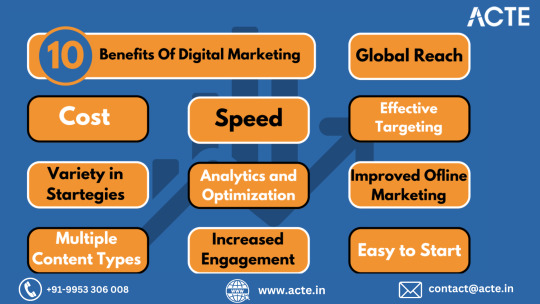
Deciphering the Mechanics of Digital Marketing:
Digital marketing operates on the principle of leveraging digital channels and technologies to connect with target audiences, deliver tailored messages, and prompt desired actions. Here's a breakdown of how it works:
Objective Identification: Businesses start by defining their marketing objectives and identifying their target audience, including demographics, interests, and preferences.
Strategic Planning: Based on their objectives and audience insights, businesses develop a comprehensive digital marketing strategy that outlines the tactics and channels they will use to achieve their goals.
Content Creation: Content is the cornerstone of digital marketing. Businesses create engaging and relevant content, such as blog posts, social media updates, videos, and infographics, to resonate with their audience and drive action.
Channel Deployment: Businesses deploy a mix of digital channels, including websites, social media platforms, email, search engines, and online advertising networks, to distribute their content and reach their target audience effectively.
Lead Engagement: Through targeted messaging and personalized communication, businesses engage with their audience, nurture leads, and guide them through the sales funnel towards conversion.
Performance Analysis: Digital marketers continuously monitor and analyze campaign performance metrics, such as website traffic, conversion rates, click-through rates, and engagement metrics. Based on these insights, they refine their strategies and optimize their campaigns for better results.
Conclusion:
Digital marketing has emerged as a fundamental component of modern business strategy, offering unparalleled opportunities for growth and engagement in an increasingly digital world. By understanding the various uses, strategies, and mechanics of digital marketing, businesses can harness its power to drive success and stay ahead of the curve in today's competitive marketplace.
#digital marketing#tech#technology#digital marketing training#digital marketing course#digital marketing trends#digital marketing company#education#search engine marketing#seo
2 notes
·
View notes